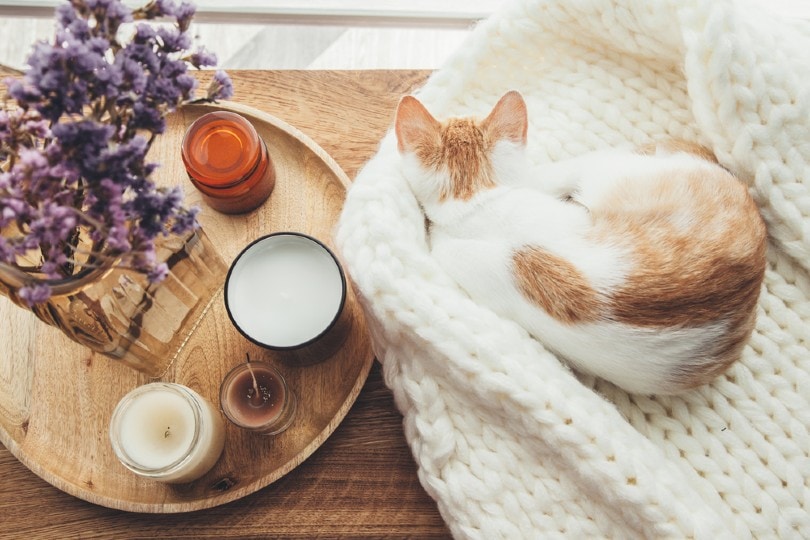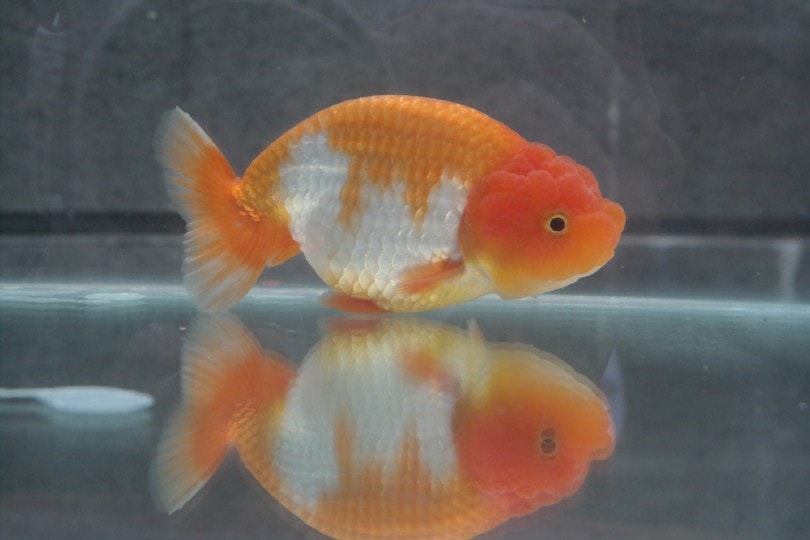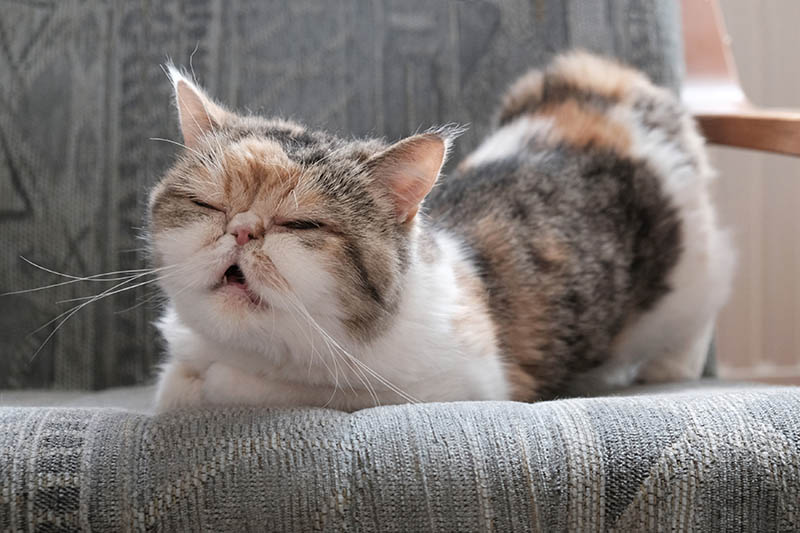Click to Skip Ahead
After a long week, it’s nice to curl up with your favorite scented candle and your feline best friend. However, you may find that your cat is less fond of the odd-smelling fragrances that you favor and will either start coughing or avoid the room entirely.
Most scented candles aren’t toxic to cats, and some varieties won’t bother them. They can create a relaxing and festive atmosphere when they’re used for short periods in well-ventilated areas. Cheaper, paraffin-based candles, on the other hand, can be toxic to both our cats and us.

The 7 Reasons Scented Candles Can Be Harmful to Cats
Not all scented candles are harmful to cats. However, there are ways for our otherwise harmless candles to be a danger to our beloved pets, and it’s important to bear these facts in mind before you use candles, fragranced or not, around your cat or any other pet.
1. Burn Risk
Whether we’re talking about cats, dogs, children, or the safety of your home, candles are dangerous when they’re not used properly. When you use them, keep them away from anything flammable, and don’t leave them unattended, especially if you have young children or cats that love to knock objects off the coffee table.
Remember that your cat can probably find their way onto shelves that you didn’t think they could get to. If they knock over your burning candle, they stand a chance at not only burning themselves but also accidentally setting the living room rug on fire.
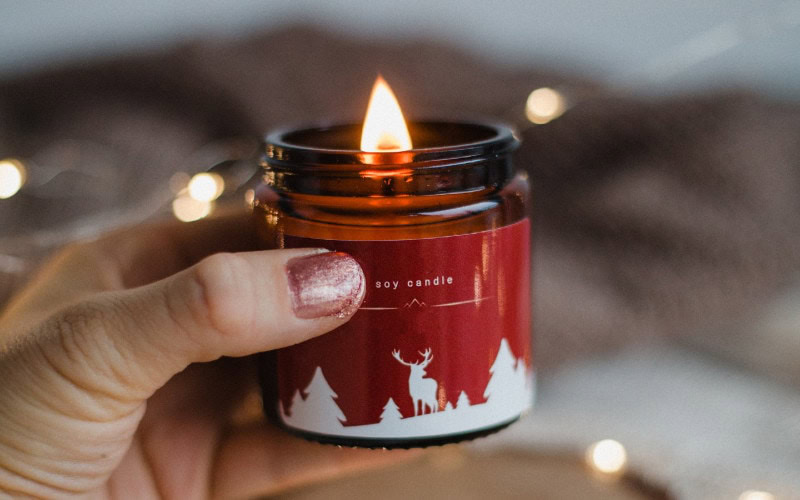
2. Essential Oils
Although essential oils are plant-based fatty liquids, they can cause adverse reactions in your cat or other pets that come into contact with them. Some oils are less toxic than others, but cats are usually more sensitive to the toxic effects than humans or other animals.
Whether your cat has a reaction to the essential oils in your scented candle depends on various factors.
3. The Plant Base
Essential oils come from plants. While this ordinarily is a good thing, some oils are toxic to cats. If they’re allergic to the plant used in your new fragrance or the plant used is toxic, the oil in the candle will be harmful, too.
4. Concentration
The few essential oils that are safe to use around cats should only be used when they’re heavily diluted. Not only will this ease the effect of the scent on sensitive noses, but it’ll also reduce the amount of oil that comes into contact with your cat.
For felines with particularly sensitive noses or asthma, the strength of the scent in your candle might bother their eyes, nose, and ability to breathe.

5. Delivery Method
Cats don’t have hands to grab things, so they resort to biting objects they’re curious about. If they’re fond of chewing on things, you may find that your feline has inadvertently swallowed some of the wax infused with essential oils.
Ingesting essential oils can cause digestive and neurological problems, even without the added problems of the candle they’re used in.
6. Paraffin
Most commercially produced candles, particularly the cheap brands, are made from a petroleum derivative called paraffin. The process of making the candles requires numerous chemicals, like dioxin and Carolyn, and petroleum-based fragrances for the scented varieties.
Not only do they release a large amount of soot when they’re burned, exacerbating health issues like asthma and other respiratory ailments for you and your cat, but they also contain carcinogens.
Paraffin candle manufacturers have also been known to use animal fat and stearic acid, a slaughterhouse byproduct, during production.
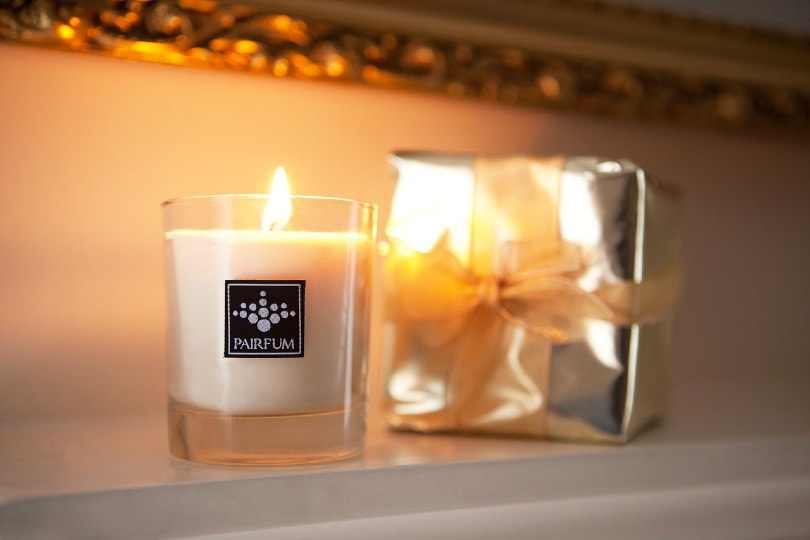
7. Your Cat
Like humans, cats have preferences when it comes to smells. While some, like citrus, are renowned for being disliked by all felines, other scents may please or disgust your cat, depending on their personality.
They usually don’t enjoy anything that smells too strong. Finding the subtler scents that they enjoy may take trial and error.
While some cats don’t mind fragrances, others might not be able to tolerate exposure to any scent-laced product. Whether chemical-based or completely natural, it’s best to avoid using anything if your feline is sensitive to these things.

The 4 Other Scented Products That Are Toxic to Cats
Avoiding scented candles doesn’t mean you’re entirely side-stepping the risk of endangering your cat. Several other products designed to freshen the air shouldn’t be used anywhere near your feline.
1. Dry Potpourri
Although dried potpourri can irritate your cat’s nose and cause stomach upset if ingested, it’s not immediately harmful. However, there is a chance that it’ll cause a blockage in your cat’s digestive system and require surgery, so make sure you don’t leave it out for your cat to chew on.
2. Liquid Potpourri
Unlike the dried version, liquid potpourri is much more dangerous to your cat. It contains cationic detergents, which allow the oil and water to mix, and essential oils.
While essential oils alone can cause respiratory issues, cationic detergents can have dire consequences. They can cause skin or eye burns, stomach and intestinal ulcers, and breathing and neurological problems.
If you use liquid potpourri, keep it out of reach of your cat and clean up any spills when they happen.
3. Air Fresheners
Air fresheners mask smells instead of eliminating them, and they can trigger asthma attacks in cats and affect dogs and humans, too.
4. Incense
While burning incense sticks can make your house smell nice, they are a mixture of essential oils and smoke. Both can adversely affect your cat. Even if the essential oil doesn’t bother your feline, their stronger noses make them sensitive to smoke, and it can cause respiratory problems.


The 6 Alternative Products Safe Around Cats
Cats seem to know when you’re about to receive guests, and some visit their litter box before the front door opens. Even when scooped and freshly cleaned, the smell lingers!
This is part of the reason that scented candles and other air fresheners are so helpful. They can mask some of the more unpleasant odors associated with cat ownership.
However, they’re not the only products that can eliminate the odors wafting in your home. There are plenty of options that will keep smells at bay and keep your cat safe.
1. Pet Odor Eliminators
Most products designed to eliminate pet odors use enzymes instead of chemical-based fragrances, which are safer for cats and gentler on sensitive noses.
No matter what kind of litter you use, bad smells often linger. That's where an effective litter additive like Hepper's Advanced Bio-Enzyme Cat Litter Deodorizer can make a big difference.
- Bio Enzymatic Cat Litter Freshener - Smart formulation uses natural ingredients eliminating cat...
- Save Money - Stuff for cats isn’t the cheapest. With this litter box odor eliminator, you’ll...
- Every Litter, Every Surface - Are you afraid this additive won’t work on your litter? Fear not!...
This biodegradable deodorizer is fragrance-free and safe for all ages of cats and types of litter. It uses bio-enzymes to naturally get rid of odors and help your litter last longer.
At PangoVet, we've admired Hepper for many years, and decided to take a controlling ownership interest so that we could benefit from the outstanding designs of this cool company!
2. Charcoal
Hanging charcoal air-purifying bags around your home can draw in water and prevent mildew smells during humid seasons. They also absorb unpleasant odors, leaving your house smelling fresh.

3. Febreze
Unlike other aerosol air fresheners, Febreze is the one brand that’s proven to be safe around pets, according to the ASPCA. It’s still a good idea to keep your cats away from it while it dries, as it has been known to cause skin irritation and minor stomach upset when ingested.
Don’t spray it straight on your cat or any other animal. Only use it for its intended purpose.
4. DIY Aromatics
Making your own scents is as easy as grabbing ingredients like clove or vanilla and adding them to a pot of simmering water. Not only will the scents be just as good as the store-bought varieties, but you can also be confident that no other chemicals are used in their production.
Although you can use citrus, your cat is unlikely to appreciate the scents of orange, lemon, or lime in the house.
5. Air Purifier
Air purifiers don’t use fragrances to make your house smell nice. Instead, they eliminate odors by removing them from the atmosphere. If you’re not on a tight budget, purchasing one of the high-end purifiers will also rid your house of particulates known to irritate cats and humans.
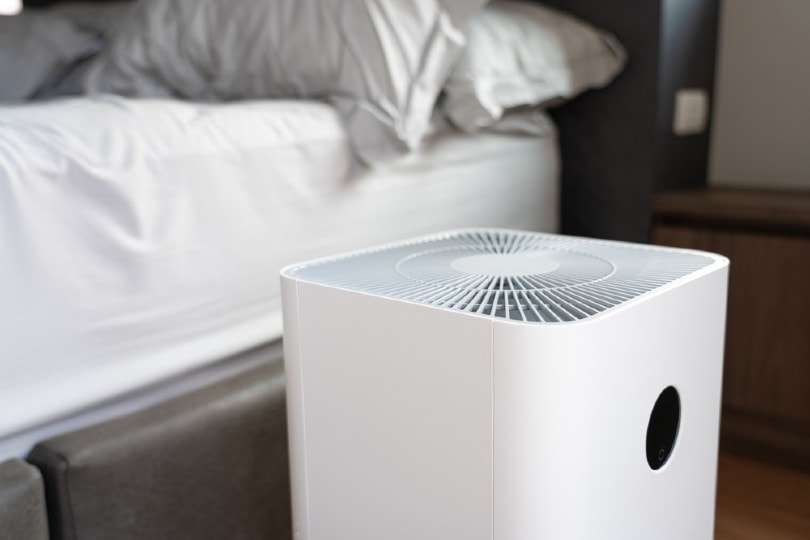
6. Natural Wax Candles
If you are willing to spend extra on scented candles, natural wax is much safer than paraffin varieties for you and your favorite feline.
These candles are made from soy, beeswax, or coconut oil. Unlike paraffin candles, they’re free from toxins and carcinogens and completely biodegradable. The fragrances they use are also natural, and the candles themselves burn longer.
You should still ensure your cat isn’t left alone with the candles because they can burn them and cause fires. Your cat will also be irritated by the scent if it’s too strong.
- Related Read: Smells That Cats Love (And Some They Don’t!)

Conclusion
The fumes from scented candles can cause respiratory issues, especially if the candle is paraffin-based. Paraffin candles give off a great deal of soot when they’re burned and release chemicals that can irritate your cat’s lungs.
Some scented candles, like those made from beeswax or coconut oil, are much more appealing and safer for your cat. They don’t contain chemicals or toxins, but it’s still not wise to use them too much because the scents can still cause breathing issues, especially for cats with asthma.
If you’re concerned about your cat inhaling smoke from candles, try making homemade aromatics by adding ingredients to a pot of simmering water or using an air purifier. While it won’t make your house smell like summer showers, it’ll eliminate the odors.
Next on your reading list:
- Are Candles Bad for Cats? What You Need to Know!
- Is a Reed Diffuser Safe for a Cat? Vet Reviewed Facts & FAQ
Featured Image Credit: Alena Ozerova, Shutterstock
